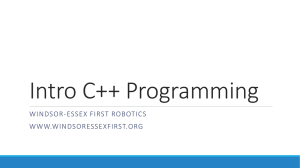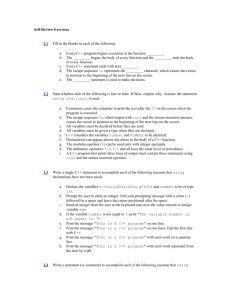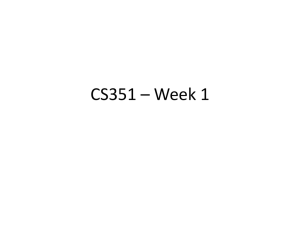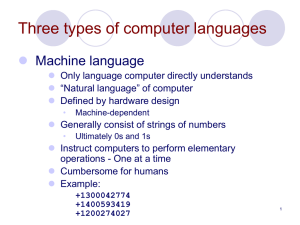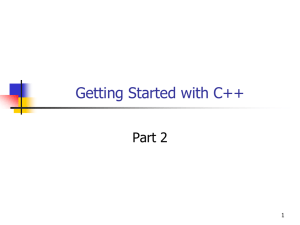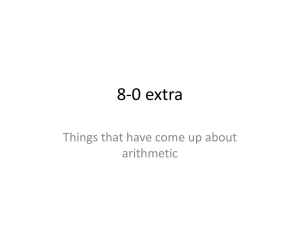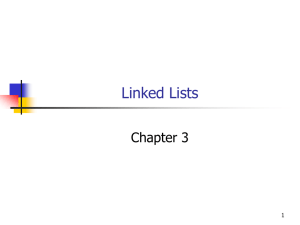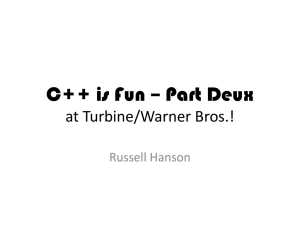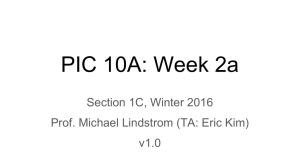CS174Week2
advertisement
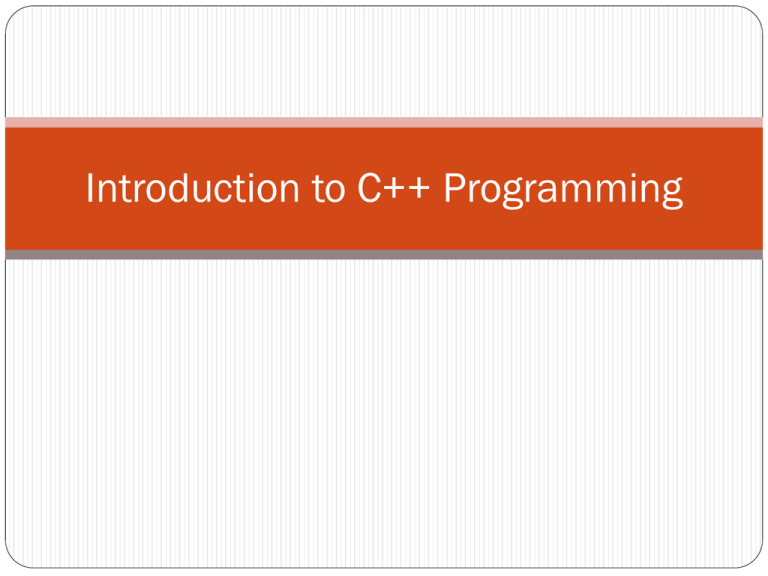
Introduction to C++ Programming
Lesson Plan
Knowledge of simple C++ program
Write simple input/output statements
Knowledge of data types, variable declaration, arithmetic
operators
Simple C++ Program by example
/* This is HelloWorld program in C++ */
#include <iostream>
using namespace std;
int main()
{
cout << "Hello World!\n This is my first C++ program\n";
return 0;
}
Simple C++ Program by example
/* This is HelloWorld program in C++ */
#include <iostream>
This is C++
using namespace std;
comment
int main()
{
cout << "Hello World!\n This is my first C++ program\n";
return 0;
}
C++ comments
Comments: Must-have, to explain what a programmer is doing
while coding
Single line comments: // this is my comment
Multiple line comments:
/*
This is my comment
This also is my comment
*/
Simple C++ Program by example
/* This is HelloWorld program in C++ */
#include <iostream>
This is C++
using namespace std;
Preprocessor
directive
int main()
{
cout << "Hello World!\n This is my first C++ program\n";
return 0;
} 1. Comment out #include <iostream> from your hello.cpp
2. Save and Compile it
3. Describe the error
Simple C++ by example
Preprocessor directive:
This is processed by the preprocessor before the program is
compiled.
Notifies the preprocessor to include in the program the content
of corresponding header file from C++ header library (i.e *.h
file)
Simple C++ Program by example
/* This is HelloWorld program in C++ */
#include <iostream>
Using
using namespace std;
declarations
int main()
{
cout << "Hello World!\n This is my first C++ program\n";
0; out using std::cout from your hello.cpp
1.return
Comment
}2. Save and Compile it
3. Describe the error
4. Change cout to be std:: cout, save and compile
Simple C++ Program by example
Using declarations eliminates the needs to repeat
std::<prefix>
So we use:
using std::cout; // for program uses cout
using std::cin; // for program uses cin
using std::endl; // for program uses endl;
….
Or we can use:
using namespace std;
Simple C++ Program by example
/* This is HelloWorld program in C++ */
#include <iostream>
using namespace std;
int main()
{
function
in is my first C++ program\n";
cout << "HelloMain
World!\n
This
C++
return 0;
}
Simple C++ Program by example
• Syntax:
int main() {
}
• Main function is a part of every C++ Program
• Exactly one function in every program must be named main
• int: means return an integer (in this context only)
1. Rename main to Main in your hello.cpp
2. Save and Compile it
3. Describe the error
Simple C++ Program by example
/* This is HelloWorld program in C++ */
#include <iostream>
using namespace std;
int main()
{
cout << "Hello World!\n This is my first C++ program\n";
return 0;
}
C++ statement
Simple C++ Program by example
Every C++ statement must end with ;
Preprocessor directives do not end with ;
<< operator: stream insertion operator
Insert the value on the right to the output stream
\n (escape sequence): new line
Simple C++ Program by example
/* This is HelloWorld program in C++ */
#include <iostream>
using namespace std;
int main()
{
cout << "Hello World!\n This is my first C++ program\n";
return 0;
Return
}
statement to exit
a function
Steps to develop a C++ Program
Editor
Preprocessor
Compiler
Linker
“On-the-fly” questions
/* This is a valid C++ comment /*
True
b. False
a.
“On-the-fly” questions
/* This is a valid C++ comment /*
True
b. False
a.
“On-the-fly” question
Every C++ statement ends with a(n):
a. }
b. {
c. ;
d. return
“On-the-fly” question
Every C++ statement ends with a(n):
a. }
b. {
c. ;
d. return
“On-the-fly” question
Every C++ program begins execution at the function
a. Main
b. MAIN
c. static main
d. main
“On-the-fly” question
Every C++ program begins execution at the function
a. Main
b. MAIN
c. static main
d. main
Variable declaration
Syntax:
<data type> <variable_name>;
If more than one variable has the same data type:
<data type> <name1>, <name2>..;
Fundamental numerical data types
Name
char
short int
(short)
Description
Size*
Character or small integer.
1byte
signed: -128 to 127
unsigned: 0 to 255
Short Integer.
2bytes
signed: -32768 to 32767
unsigned: 0 to 65535
int
Integer.
4bytes
long int
(long)
Long integer.
4bytes
Floating point number.
4bytes
float
double
long
double
Range*
signed: -2147483648 to
2147483647
unsigned: 0 to 4294967295
signed: -2147483648 to
2147483647
unsigned: 0 to 4294967295
+/- 3.4e +/- 38 (~7 digits)
Double precision floating point number. 8bytes
+/- 1.7e +/- 308 (~15 digits)
Long double precision floating point
number.
+/- 1.7e +/- 308 (~15 digits)
8bytes
Variable names
It must be a legal identifier.
It must not be a keyword, a boolean literal (true or
false), or the reserved word.
It must be unique within its scope.
Identifier
A valid identifier is a sequence of one or more letters, digits or
underscore characters (_).
Identifiers may only begin with a letter, or _.
Keyword:
http://www.cplusplus.com/doc/tutorial/variables/
C++ is case sensitive language
Example
int firstNumber;
int secondNumber;
int sum;
All variables in C++ MUST be
declared before being used
int firstNumber, secondNumber, sum;
Reading a value from keyboard
Example:
cin >> firstNumber;
A cin statement uses the input stream object cin (of
namespace std) and the stream extraction operator,
>>, to obtain a value from the keyboard.
Usually you will need a prompt it directs the user to take
a specific action before putting cin statement
Assignment statement
<variable name> = <expression>;
Example:
sum = firstNumber + secondNumber;
Or
sum = 6+7;
Arithmetic Expression
Any expression involving numerical value is called arithmetic
expression
For example:
x+15
y /16
Arithmetic operators
Addition: +
x+y
Subtraction: x-y
Multiplication: *
x*y
Division: /
x/y
Modulo: %
x%y
Arithmetic
Most programs perform arithmetic calculations.
The asterisk (*) indicates multiplication.
The percent sign (%) is the modulus operator:
C++ provides the modulus operator, %, that yields
the remainder after integer division.
The modulus operator can be used only with integer
operands.
Integer division (i.e., where both the numerator and the
denominator are integers) yields an integer quotient.
Any fractional part in integer division is discarded
(i.e., truncated)—no rounding occurs.
Arithmetic
C++ applies the operators in arithmetic expressions in a
precise sequence determined by the following rules of
operator precedence, which are generally the same as those
followed in algebra.
Arithmetic
There is no arithmetic operator for exponentiation in C++,
so x2 is represented as x * x.
As in algebra, it’s acceptable to place unnecessary parentheses
in an expression to make the expression clearer.
These are called redundant parentheses.
Constant and variables
Constant:
Value it contains doesn’t change
Two ways to declare a constant in C++:
#define <constant name> <value>; // using
preprocessor directives
const <datatype> <constant name>; // inside
the program
Variables:
Value it contains may vary
int sum;
sum =0;
sum = firstNumber + secondNumber;
Operator <<
Using multiple stream insertion operators (<<) in a single
statement is referred to as concatenating, chaining or
cascading stream insertion operations.
Calculations can also be performed in output statements.
Memory Concepts
Variable names such as firstNumber,
secondNumber and sum actually correspond to
locations in the computer’s memory.
Every variable has a name, a type, a size and a value.
When a value is placed in a memory location, the
value overwrites the previous value in that location;
thus, placing a new value into a memory location is
said to be destructive.
©
1
9
9
2
2
0
1
0
b
y
P
e
a
r
s
o
n
E
d
u
c
a
